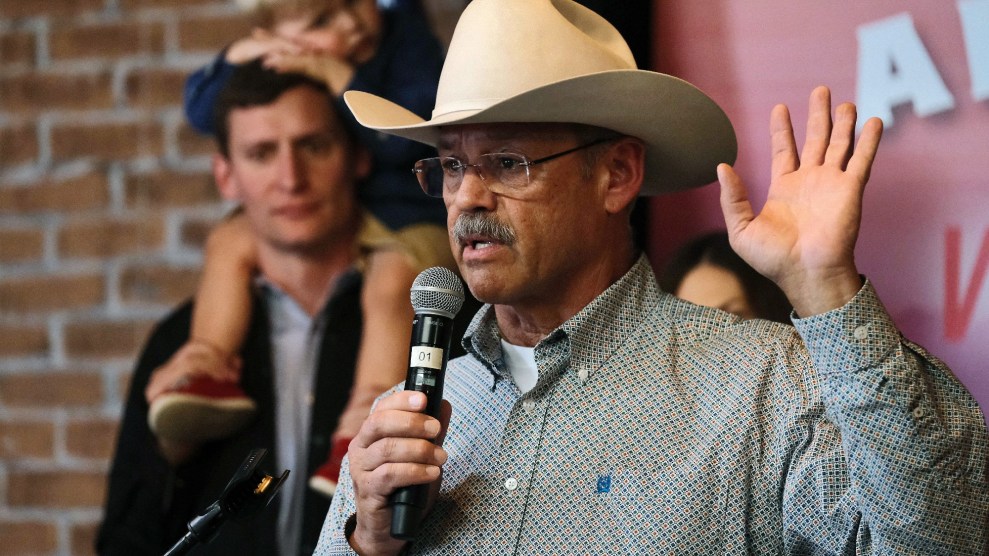
Evangelical pastor Jimmy Morales, left, prays over Jim Marchant at the Las Vegas launch event for Marchant's Senate campaign.John Locher/AP
Republican Jim Marchant moved to Las Vegas in 2003 after his business career ended in financial ruin, but he retained the shamelessness of any self-respecting Florida man. In 2016, he won a seat in the Nevada Assembly, but was unseated after a single term. Two years later, in 2020, he lost a bid for Congress before proceeding to try and overturn the results of the election. He lost again in 2022, this time running for Nevada secretary of state as an election denier.
Now Marchant says he’s running for US Senate.
There’s little reason to believe the fourth time will prove the charm, but Marchant is still likely to cause headaches for national Republicans who may have to spend millions trying to defeat him in the primary. If he prevails, Marchant will face Sen. Jacky Rosen, one of the Senate’s most vulnerable incumbents. Democrats would be thrilled to face the kind of QAnon-friendly candidate that swing voters largely rejected in 2022.
Marchant announced his Senate run on Tuesday at Fervent, a Las Vegas evangelical church. He was joined virtually by far-right fixtures including Michael Flynn and Rep. Paul Gosar (R-Nev.), who is in Viktor Orbán’s Hungary this week for CPAC Budapest. Marchant avoided his usual focus on election integrity—he instead emphasized his personal story and more traditional Republican issues like border security and gun rights.
As with his previous campaigns, Marchant is selling himself as an accomplished businessman. “My background is technology,” he said in his announcement speech. “I’m a businessman. I’m an entrepreneur…I started three successful technology companies.” As I reported last year, this depiction of success is largely fictionalized. Marchant’s largest venture, a high-speed internet company, quickly burned through some $17 million in startup capital before it imploded in 2001. A former employee said of his old boss, “I would not want Jim to be secretary of a preschool.”
A financial affidavit Marchant filed during a 2010 divorce showed he had $63,106 in credit card debt. A subsequent disclosure for his 2020 congressional race revealed that Marchant didn’t own a home, and that he was still paying off a personal loan from 2009. “Mother Jones did some sort of colonoscopy on me and they came up with everything,” he later told Steve Bannon.
Shortly after the 2020 election, Marchant has said he checked himself into a suite at The Venetian in Las Vegas to work with Donald Trump supporters to reverse the results of his own race and the presidential election. While there, he received a surprise visit from Juan O. Savin, a fringe QAnon influencer. It was Savin, Marchant said, who first persuaded him to run for secretary of state and launch a national coalition of like-minded candidates.
The Senate campaign got started after another surprise meeting. During a visit to Mar-A-Lago this spring, Newsmax CEO Chris Ruddy introduced him to Dick Morris, the disgraced Bill Clinton consultant whose career never recovered from a tabloid story involving a sex worker and sucking on toes.
Marchant recounted the meeting at his campaign launch. “I’m, like, in awe,” he said. “I’m, like, starstruck: Dick Morris! The Dick Morris.” The day after their meeting, Morris offered to run Marchant’s campaign. “It was a no-brainer,” Marchant said. “The rest is history.” Marchant accepted the offer, he added.
Later in his speech, Marchant took partial credit for Section 230, the portion of the Communications Decency Act of 1996 that gives social media companies legal immunity for the content on their platforms. Many on the right now want Section 230 repealed, but Marchant was keen to take credit.
He claimed he helped write the law while leading a trade group for internet service providers. “It’s a very interesting story,” Marchant explained. “Now, I don’t condone this, but the porn industry came to us and said, ‘We’re being discriminated against.’” Being a “constitutionalist,” he decided to “do the right thing” and help them out. As Marchant went out of his to way to take credit for helping porn sites, the crowd at the church remained silent. After three losses in a row, Marchant is still learning.

















